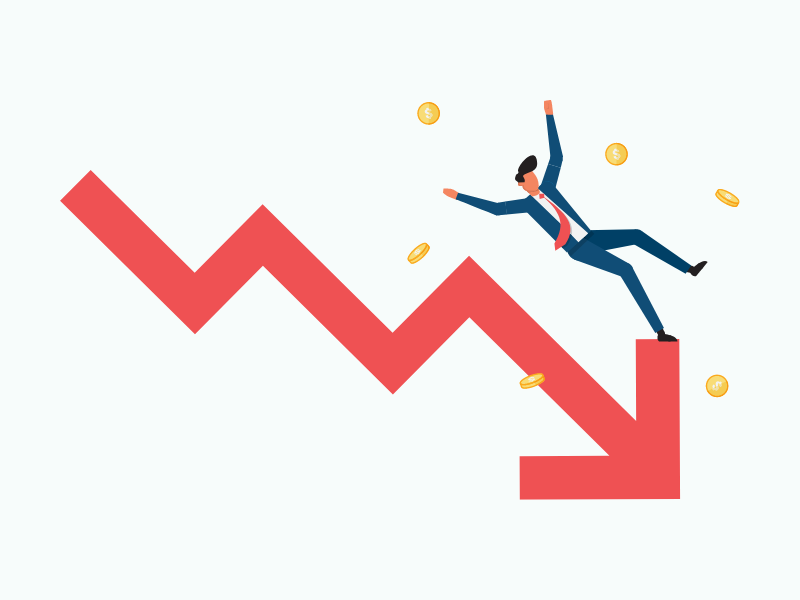The 2022 Recession Is Officially Here

The second gross domestic product (GDP) report was released on Thursday and it decreased at an annual rate of 0.9%.
This means that the United States is officially in a recession. This was expected since recessions usually follow periods of high inflation, and we recently rose to a 9.1% inflation rate in June.
This is unfortunate news for many. However, wise investors can take advantage of the declining economic times we are in to grow their net worth in the upcoming couple of years.
If you are a long-term investor, looking to invest your money for a minimum of five years, recession investing could be great for your portfolio.
What Is a Recession?

A recession is identified when there is a decline, lasting more than two quarters, in the following five economic sectors: employment, manufacturing, income, retail sales, and gross domestic product.
Simply put, it is a slowdown in economic growth that is usually caused by a rise in inflation.
During recessions, the stock market usually takes a steep dive and can lose up to 40% of its value, if not more. If you are a long-term investor, you can take advantage of recessions by investing in undervalued assets.
This tends to be profitable since you are betting that the economy will continue to grow over the next couple of years and you are not looking for instant growth.
If you would like to adopt a long-term investing strategy, then consider the following five ways to invest your cash for growth during this recession.
1. Dividend Stocks

Dividend investing is one of my favorite ways to buy stocks because of the passive income you get from it. Dividend-paying stocks are companies that pay you a portion of their profits for holding their stock.
These are usually well-established companies that would rather pay a portion of their profits to investors than spend them on research and development.
I recommend sticking with dividend aristocrats. These are companies that have paid and increased their dividends for at least 25 consecutive years.
Given the history of the dividend, you can judge that the company is in good standing and will continue to pay its investors regardless of economic decline or recession.
The majority of dividend stocks are on sale right now, and this makes it a great time to dollar-cost average into them. The great thing about this is that you will collect dividends whether this recession is short-lived or long-drawn-out.
2. Real Estate

It is possible that home values decline during a recession. We have already seen a 20% decline in mortgages since last year.
But regardless of where the price goes in the short-term, real estate is always recommended by experts as it is a long-term investment and prices will increase in the long term.
While the economy recovers from a recession, a good strategy is to buy a real estate property and rent it out for a fixed monthly income. That way, you are making passive income and could always sell the property a couple of years later for a profit.
Given that interest rates have been increasing to combat the rising inflation rates, if you can summon the cash for a downpayment on a property, then REITs would be a better option for you.
3. REITs

A REIT stands for a real estate investment trust. Simply put, it is a mutual fund for real estate investing for those who do not want the headaches of owning and managing a property.
My favorite advantages of owning a REIT are the high dividend yield and the fact that the profits are distributed to the investors on a monthly basis, just as if you were to collect rent from your tenant.
Many investors choose to go this route as it is easier to buy and sell a REIT compared to the traditional way of buying and selling a home.
The benefit here is that you can dollar-cost average in a fund that operates and manages any type of property you are interested in. This could be healthcare, residential, commercial, or warehouses.
However, this does not give you the tax benefits that physical property grants you.
4. Commodities

Commodities are an investment class that is either a raw resource or an agricultural product. Examples of commodities include gold, silver, oil, etc. Usually, demand for these kinds of commodities increases as inflation rises and the economy enters a recession.
You can invest in commodities by either buying the actual resource or investing in a mutual fund or ETF. These funds are essentially a basket of securities that track an underlying asset.
I include commodities in my portfolio with an allocation of 5%. This is split between gold and silver.
5. Cryptocurrency

I believe that Bitcoin is one of the assets that will stay stable during a recession. Bitcoin is a decentralized asset that is essentially considered to be "digital gold".
Experts consider Bitcoin to be a robust defensive asset, much like gold. Regardless, Bitcoin has yet to encounter a recession, so it is premature to say that it can survive one.
But it is still a good way to diversify your portfolio and expose yourself to some life-changing returns. This is especially a special time for crypto since it has been in decline and is currently sitting at the high of the previous crypto bull market.
I personally dollar-cost average into Bitcoin and Ethereum every day by buying $50 of each.
Conclusion
Warren Buffet, one of the greatest investors of all time, said, "Be fearful when others are greedy. Be greedy when others are fearful. "
There has been a lot of fear in the market recently. But if you are a long-term investor, a recession shouldn't worry you. Just be sure to not let your emotions take control and cause you to sell when prices start to plummet.
The truth is that no one can time the beginning or end of a recession. We now know that we have been in a recession for the past 6 months.
Where we go from here is uncertain, but the best strategy is to continue investing while prices remain low.
Dollar-cost averaging into long-term diversified positions will pay off when the economy starts to recover.
Have a great week!
Muhamed
📖 Quote of the Week
Be fearful when others are greedy. Be greedy when others are fearful - Warren Buffet

